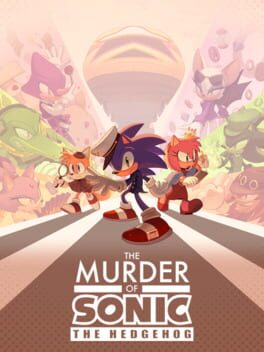5 reviews liked by cantilena
Hades 2
2001
wait a minute
Hades 2
2001
not this one
Baldur's Gate 3
2020
shadowheart kissing simulator
Phoenix: The witness claims that The Murder of Sonic the Hedgehog is, quote: "Just like Ace Attorney," but that claim clearly contradicts the evidence!
Edgeworth: What are you on about, Wright? The lack of courtroom scenes again? I'll remind you that you yourself just wasted fifteen minutes of the court's time proving that nobody in the West knows the legacy of Japanese detective visual novel.
Phoenix: What I'm "on about," Mr. Edgeworth, is this!
[Shitty Minigame]
A terrible mobile runner-ass minigame, played every few minutes. It's very boring.
> Present
Edgeworth: But that's...
Phoenix: The existence of this godawful minigame whenever the player character needs to 'think' can lead us to only one conclusion! The Murder of Sonic the Hedgehog... is actually Dangan Ronpa!
Judge: This trial was supposed to be about insider trading.
Edgeworth: What are you on about, Wright? The lack of courtroom scenes again? I'll remind you that you yourself just wasted fifteen minutes of the court's time proving that nobody in the West knows the legacy of Japanese detective visual novel.
Phoenix: What I'm "on about," Mr. Edgeworth, is this!
[Shitty Minigame]
A terrible mobile runner-ass minigame, played every few minutes. It's very boring.
> Present
Edgeworth: But that's...
Phoenix: The existence of this godawful minigame whenever the player character needs to 'think' can lead us to only one conclusion! The Murder of Sonic the Hedgehog... is actually Dangan Ronpa!
Judge: This trial was supposed to be about insider trading.
Signalis
2022
This review contains spoilers
Metaphor for a missing moment
Pull me into your perfect circle
One womb, one shame, one resolve
Liberate this will to release us all
Gotta cut away, clear away
Snip away and sever this umbilical residue
Keeping me from killing you
And from pulling you down with me in here
I can almost hear you scream
---------------------------------------------------------
Signalis is about cycles, loops, circles and other various forms of figurative ouroboroi.
I don't think it's a coincidence that in stark contrast to its robotic protagonist, the bulk of the horror in Signalis is of the viscerally organic and fleshy breed: cancer is not only a direct element of the plot as Ariane (as well as countless background characters) suffer the effects of radiation poisoning, but the means by which Signalis marks its steady detachment from reality. Pulsating masses of gory red flesh and throbbing tumors permeate more and more of the game as time goes on, from the lesions and clumps adorning the enemies to the pseudosentient piles of viscera that block your path within the game's final area.
Cancer is an abundance of life, spontaneous cell growth without aim, measure or reason - a natural cycle being thrown out of balance much like Elster's refusal to allow the loop to come to an end over her dozens, if not hundreds of journeys to keep her promise. Elster and Ariane both have a trait in common in that they seem hesitant to accept death as the natural end of the cycle they exist in, with the former not only refusing to give up no matter how many times she fails but also evidently having chickened out of her promise to mercy kill Ariane (herself having been unwilling to let Elster kill her in the past, instead choosing a longer life of prolonged suffering as the radiation poisoning robbed her of her body, spirit and livelihood) countless times across her loops.
The "Promise" ending signifies an acceptance of death as not only a natural part of the cycle of life, but as a reprieve from suffering: in breaking the cycle of the loops by fulfilling her promise, killing Ariane and finally dying herself Elster finally puts a stop to the infinite suffering of all that are involved in it, from herself and Ariane to Isa and even to antagonists such as Falke and Adler. Death is natural, infinity being a concept humans are not equipped to comprehend nor experience - and though it is tragic love need not be cut short by the departure of one or both involved parties.
If anything, the imagery of cancer as life in abundance applies equally to their love: while it was indeed the source of the pain and suffering that all characters of Signalis are trapped in, it is also a bond that no amount of turmoil, strain or time passed can truly break. Even as Elster and Ariane spend their last living moments together their love for one another is perhaps more strong than it has ever been - dying at one another's sides with each other being the last thing they see or think about. The love goes down with the lovers, those final seconds of life etched into the annals of time for all eternity. Nothing can take that from them, not those who would keep them apart, not the institutions that would forbid their romance, not even death itself. That love persisted through an eternity's worth of cycles as Elster tried time and time again to no avail to find Ariane, her promise being the sole motivating factor as she endured and doled out untold amounts of turmoil and despair.
In sum, I don't think the promise between Elster and Ariane is explicitly, specifically and exclusively referring to Elster's promise to kill Ariane when she could no longer bear to live.
I think the promise was "I'll love you forever."
Pull me into your perfect circle
One womb, one shame, one resolve
Liberate this will to release us all
Gotta cut away, clear away
Snip away and sever this umbilical residue
Keeping me from killing you
And from pulling you down with me in here
I can almost hear you scream
---------------------------------------------------------
Signalis is about cycles, loops, circles and other various forms of figurative ouroboroi.
I don't think it's a coincidence that in stark contrast to its robotic protagonist, the bulk of the horror in Signalis is of the viscerally organic and fleshy breed: cancer is not only a direct element of the plot as Ariane (as well as countless background characters) suffer the effects of radiation poisoning, but the means by which Signalis marks its steady detachment from reality. Pulsating masses of gory red flesh and throbbing tumors permeate more and more of the game as time goes on, from the lesions and clumps adorning the enemies to the pseudosentient piles of viscera that block your path within the game's final area.
Cancer is an abundance of life, spontaneous cell growth without aim, measure or reason - a natural cycle being thrown out of balance much like Elster's refusal to allow the loop to come to an end over her dozens, if not hundreds of journeys to keep her promise. Elster and Ariane both have a trait in common in that they seem hesitant to accept death as the natural end of the cycle they exist in, with the former not only refusing to give up no matter how many times she fails but also evidently having chickened out of her promise to mercy kill Ariane (herself having been unwilling to let Elster kill her in the past, instead choosing a longer life of prolonged suffering as the radiation poisoning robbed her of her body, spirit and livelihood) countless times across her loops.
The "Promise" ending signifies an acceptance of death as not only a natural part of the cycle of life, but as a reprieve from suffering: in breaking the cycle of the loops by fulfilling her promise, killing Ariane and finally dying herself Elster finally puts a stop to the infinite suffering of all that are involved in it, from herself and Ariane to Isa and even to antagonists such as Falke and Adler. Death is natural, infinity being a concept humans are not equipped to comprehend nor experience - and though it is tragic love need not be cut short by the departure of one or both involved parties.
If anything, the imagery of cancer as life in abundance applies equally to their love: while it was indeed the source of the pain and suffering that all characters of Signalis are trapped in, it is also a bond that no amount of turmoil, strain or time passed can truly break. Even as Elster and Ariane spend their last living moments together their love for one another is perhaps more strong than it has ever been - dying at one another's sides with each other being the last thing they see or think about. The love goes down with the lovers, those final seconds of life etched into the annals of time for all eternity. Nothing can take that from them, not those who would keep them apart, not the institutions that would forbid their romance, not even death itself. That love persisted through an eternity's worth of cycles as Elster tried time and time again to no avail to find Ariane, her promise being the sole motivating factor as she endured and doled out untold amounts of turmoil and despair.
In sum, I don't think the promise between Elster and Ariane is explicitly, specifically and exclusively referring to Elster's promise to kill Ariane when she could no longer bear to live.
I think the promise was "I'll love you forever."



